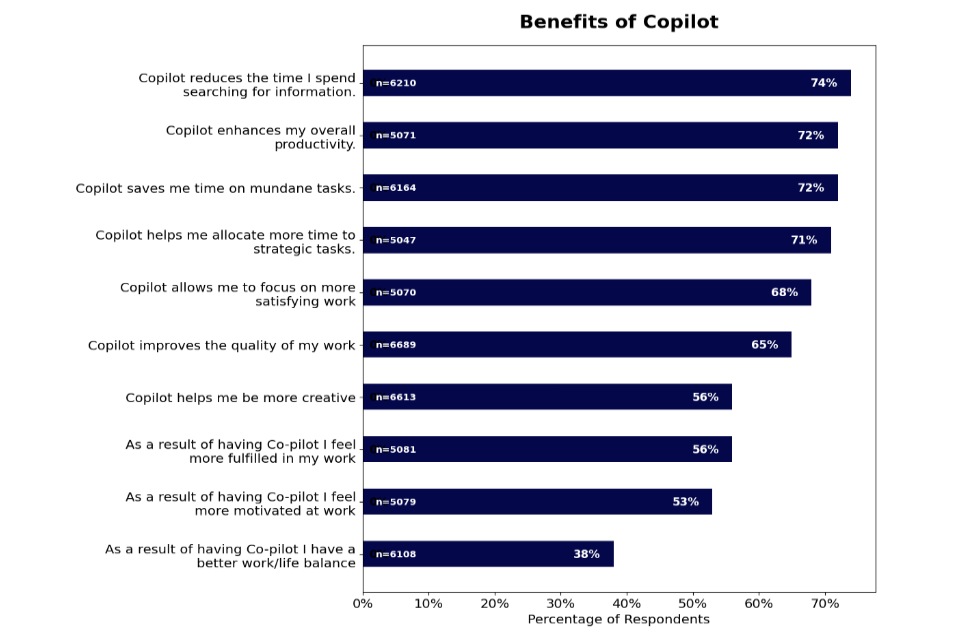UK Government’s Microsoft 365 Copilot Experiment: A Leap Toward AI-Driven Productivity
This trial involved 20,000 civil servants across 12 major government organizations, marking it as the largest deployment of Microsoft 365 Copilot in UK government history.
 In a bold move to modernize public sector operations, the UK Government Digital Service (GDS) conducted a groundbreaking three-month experiment with Microsoft 365 Copilot, an AI-powered assistant integrated into Microsoft’s productivity suite, including Word, Excel, PowerPoint, Outlook, and Teams.
In a bold move to modernize public sector operations, the UK Government Digital Service (GDS) conducted a groundbreaking three-month experiment with Microsoft 365 Copilot, an AI-powered assistant integrated into Microsoft’s productivity suite, including Word, Excel, PowerPoint, Outlook, and Teams.
Running from September 30 to December 31, 2024, this trial involved 20,000 civil servants across 12 major government organizations, marking it as the largest deployment of Microsoft 365 Copilot in UK government history.
The recently published findings, detailed in the Microsoft 365 Copilot Experiment: Cross-Government Findings Report, reveal significant strides in productivity, efficiency, and user satisfaction, while also highlighting areas for further refinement.
Staff Efficiency and Productivity
The experiment aimed to evaluate whether AI tools like Copilot could enhance user satisfaction, reduce task effort, and improve overall productivity in the public sector. With an 83% adoption rate within the first month—sustained at around 80% throughout—the trial demonstrated strong engagement among participants. This high uptake reflects the tool’s seamless integration into familiar Microsoft 365 applications, allowing civil servants to incorporate AI assistance into their daily workflows without significant disruption.
One of the standout findings was the time savings reported by users. On average, participants saved 26 minutes per day, equivalent to roughly two weeks annually per employee, aligning with findings reported by the Financial Times. Over a third of users saved more than 30 minutes daily, primarily by automating repetitive administrative tasks such as drafting emails, summarizing documents, and managing data.
These efficiencies allowed civil servants to redirect their focus to strategic priorities, delivering greater value to taxpayers. For instance, the report highlights that Copilot’s ability to summarize meeting notes and generate action items in Microsoft Teams was particularly valued, reducing the time spent on post-meeting follow-ups.
User satisfaction was another key metric, with 85% of participants agreeing that Copilot provided good value to their organizations, and 82% expressing reluctance to return to work without it. The tool not only boosted productivity but also enhanced work quality and motivation, with users reporting that it alleviated the mental burden of mundane tasks.
This aligns with broader research, such as a Microsoft-commissioned study by Public First, which estimates that effective AI rollout could save the UK public sector £17 billion by 2035.

However, the experiment wasn’t without challenges. Approximately 17% of users reported no significant time savings, particularly those in roles with less administrative overhead, where Copilot’s impact was less pronounced. Professions with the lowest time savings also recorded the lowest satisfaction scores, suggesting that the tool’s effectiveness varies by job function. Integration issues with non-Microsoft applications, such as accessibility tools like JAWS, were noted, echoing findings from a similar Australian government trial.
Additionally, concerns about data security and the potential for Copilot to access sensitive information underscored the need for robust governance and training in prompt engineering to maximize its benefits.
The report also touches on broader implications, including the potential for AI to reshape public sector roles. While Copilot was praised for improving accessibility—such as rewriting documents in plain English—there were concerns about skill decay in areas like writing and summarization, particularly among junior staff. The Australian trial similarly noted risks of job displacement, especially for administrative roles disproportionately held by women and entry-level employees, highlighting the need for careful monitoring to ensure equitable outcomes.
To build on these findings, the GDS has established an AI adoption unit to further integrate AI into public services responsibly. This unit will explore a range of AI tools to identify use cases that deliver the most value, ensuring trust, accountability, and alignment with the government’s Blueprint for Modern Digital Government. The experiment’s success has positioned the UK as a leader in public sector AI adoption, with plans to refine implementation strategies to address limitations and maximize impact across diverse roles.
The trial’s results underscore a transformative opportunity for the public sector. By automating routine tasks, Copilot frees up civil servants to focus on high-value work, potentially revolutionizing service delivery.
However, the report emphasizes the importance of tailored training, adaptive governance, and ongoing evaluation to mitigate risks like bias and skill erosion. As the UK government moves forward, this experiment serves as a compelling case study for how AI can drive efficiency and innovation, provided it is deployed thoughtfully and inclusively.



